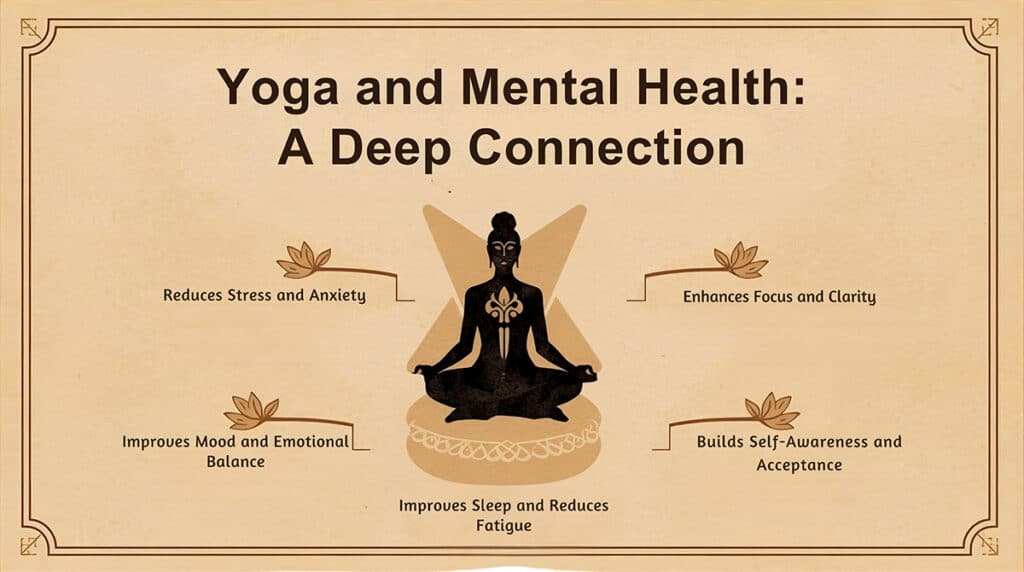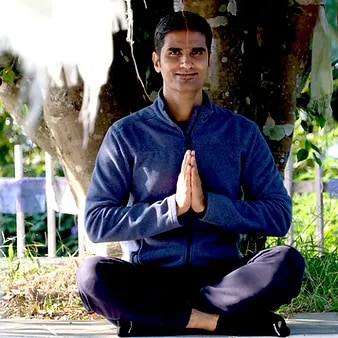Healing the Mind Within: How Yoga Supports Mental Health on World Mental Health Day
by Hardik Mehta

In a world that never stops moving, mental health has become one of the most important conversations of our time. Every year on October 10, the world comes together to observe World Mental Health Day, an initiative by the World Health Organization (WHO) that reminds us to prioritize our mental and emotional well-being.
The theme for World Mental Health Day often revolves around awareness, inclusivity, and the right to mental wellness for all. But beyond awareness, the question remains — how do we actually take care of our minds every single day?
That’s where yoga steps in.
Yoga isn’t just about flexibility or strength; it’s a holistic practice that aligns the body, mind, and breath — offering a powerful tool to nurture inner peace, reduce anxiety, and strengthen mental resilience.
In this blog, we’ll explore how yoga can play a transformative role in improving mental health, how it connects to the message of World Mental Health Day, and how Sayujya Yoga can help you begin that healing journey.
Understanding the Essence of World Mental Health Day
World Mental Health Day is more than just a date on the calendar — it’s a global movement to remove the stigma around mental illnesses and encourage open conversations about emotional well-being.
According to WHO, one in every eight people in the world lives with a mental health condition. From stress and anxiety to depression and burnout, mental health challenges affect everyone differently. The goal of this day is to remind us that mental health is a universal right — just like physical health.
However, in today’s fast-paced world, where constant digital noise and life pressures dominate, many of us fail to notice when our minds are calling for help.
That’s why practices like yoga and meditation are becoming essential — not just as fitness trends but as life tools for emotional balance.
Yoga and Mental Health: A Deep Connection

Yoga, which originated in India thousands of years ago, was designed as a spiritual discipline that harmonizes the body, breath, and consciousness. Modern science now supports what ancient yogis have always known — yoga is deeply therapeutic for the mind.
Here’s how yoga supports better mental health:
1. Reduces Stress and Anxiety
When you step onto your mat, you leave behind the chaos of your day.
Breathing practices like Pranayama and postures like Child’s Pose (Balasana) or Legs Up the Wall (Viparita Karani) activate the parasympathetic nervous system — the “rest and digest” mode. This reduces cortisol (the stress hormone), calms the mind, and brings immediate relaxation.
2. Improves Mood and Emotional Balance
Yoga encourages the release of endorphins — the feel-good hormones that elevate mood and combat depression. Regular practice also balances the body’s energy flow, helping reduce mood swings and emotional fatigue.
3. Enhances Focus and Clarity
Mental clutter often leads to confusion, overthinking, and burnout. Mindful movement and meditation sharpen concentration and help you gain clarity.
As you hold postures and observe your breath, you learn to stay present — a practice that naturally extends beyond the mat.
4. Builds Self-Awareness and Acceptance
Yoga teaches you to listen — not just to your body but to your thoughts and emotions.
Through awareness, you begin to understand your patterns, accept yourself without judgment, and nurture compassion — a key step toward healing mental and emotional wounds.
5. Improves Sleep and Reduces Fatigue
Insomnia and poor sleep are often signs of mental unrest. Restorative yoga and guided relaxation (Yoga Nidra) can help improve sleep quality, leaving you refreshed and mentally stable.
Mindfulness, Movement, and the Breath: The Yogic Formula for Inner Peace
At its core, yoga unites mindfulness, movement, and breath — three components vital for mental health.
- Mindfulness keeps you grounded in the present, reducing stress caused by regrets of the past or worries about the future.
- Movement releases physical tension and stagnant energy.
- Breath (Prana) connects your inner and outer worlds, restoring calm and clarity.
When practiced together, these elements create a profound inner balance — something modern therapy and psychology now emphasize through techniques inspired by yoga, like mindful breathing and body awareness.
The Role of Yoga in Managing Common Mental Health Issues
Let’s explore how yoga can be beneficial for specific mental health challenges:
1. Yoga for Anxiety
Anxiety often manifests through restlessness, rapid breathing, and an overactive mind.
Gentle asanas like Cat-Cow (Marjaryasana-Bitilasana) and Forward Fold (Uttanasana) soothe the nervous system.
Slow, deep breathing and guided meditation help regulate the heartbeat and reduce panic symptoms.
2. Yoga for Depression
Depression can make movement difficult, but simple postures like Sun Salutations (Surya Namaskar) or Bridge Pose (Setu Bandhasana) help release endorphins and increase energy.
Meditative practices like Yoga Nidra or loving-kindness meditation nurture self-compassion and hope.
3. Yoga for Stress and Burnout
Burnout is a result of chronic stress and emotional exhaustion.
Incorporating short daily yoga sessions and breathwork like Alternate Nostril Breathing (Nadi Shodhana) can restore balance and reduce fatigue.
4. Yoga for Emotional Healing
Trauma-sensitive yoga helps individuals reconnect with their bodies safely and gently. It promotes emotional release and body awareness, often complementing professional therapy.
Celebrating World Mental Health Day with Yoga Practice
If you’re wondering how to celebrate World Mental Health Day, the answer lies in connection with yourself, with others, and with your inner peace.
Here are a few simple ways to mark the day mindfully:
- Start your day with gratitude and Pranayama.
Take 5 minutes to breathe deeply and thank your mind and body for supporting you. - Join a community yoga class.
Practicing with others fosters belonging — something vital for emotional health. - Digital Detox for a Day.
Disconnect from social media and reconnect with yourself. - Journal your feelings after yoga.
Writing after meditation or yoga helps process emotions and track your mental state - End your day with Yoga Nidra or guided relaxation.
Let go of your worries before you sleep.
How Sayujya Yoga Helps You Nurture Mental Well-being
If you’re ready to make yoga a part of your mental health journey, Sayujya Yoga is the perfect place to begin. Rooted in traditional wisdom yet adapted for modern lifestyles, Sayujya Yoga offers programs that go beyond physical postures — focusing on mindfulness, breathwork, and holistic healing.
Every session at Sayujya Yoga is guided by the philosophy that true wellness begins within. On this World Mental Health Day, take a step toward balance — not just for your body, but for your mind and soul.
Final Thoughts
World Mental Health Day reminds us that it’s okay to seek help, take a break, and prioritize self-care. Yoga is not a replacement for therapy or medication, but it’s a deeply supportive companion in your mental health journey.
With consistent practice, yoga teaches you to breathe through chaos, stay grounded during challenges, and cultivate a peaceful mind — one breath at a time.
So, on this World Mental Health Day, unroll your mat, take a deep breath, and let yoga guide you toward a calmer, happier self.
About the Author

Hardik Mehta
Hardik is an E-RYT 500 & YACEP (Yoga Alliance Continuing Education Provider), Yoga Alliance, USA. He has been practicing yoga for the last 9 years. Prior to finding his true calling in Yoga, he was working with various corporates for 12 years in the Retail and eCommerce sector.
